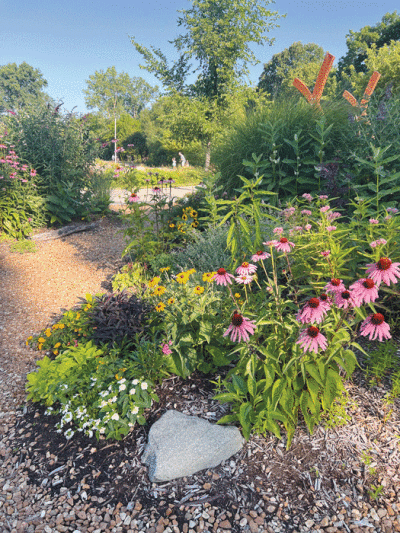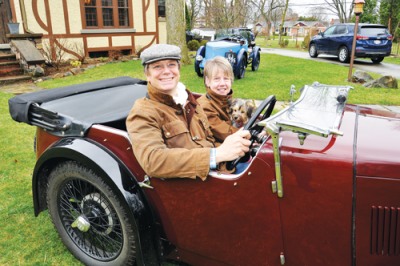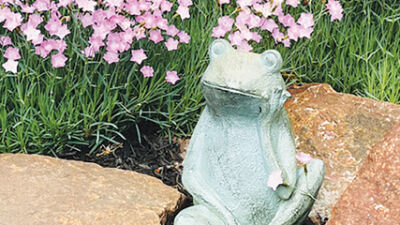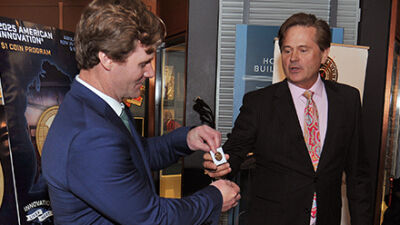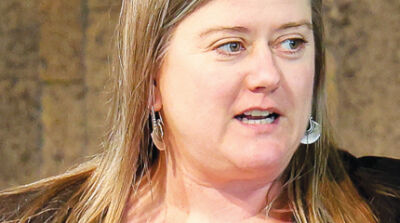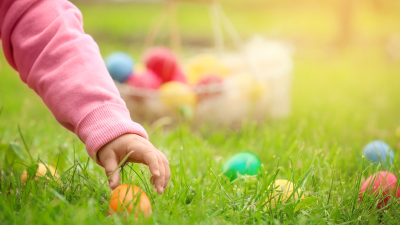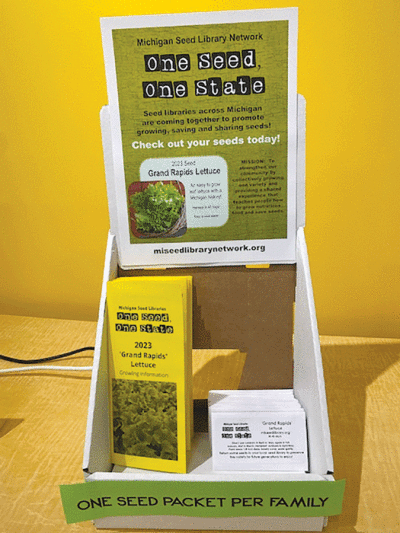
In mid-April, seed packets will be available that are donated by Gro-Town at all four Warren Public Library branches. They are designated for children to take home and plant with their families.
Photo by Lisa Martin

Rochester Pollinator board members Amber Quesenberry, left, and Stephanie Bordo Smith pose with some of the seeds featured in the seed library.
Photo by Marilyn Trent
METRO DETROIT — Each year, Michiganders eagerly wait for Old Man Winter to take his final breath and allow Mother Nature to usher in spring with new life. For those who have been shut inside all winter, spring brings much-needed fresh air and allows for reconnecting with nature.
Local libraries encourage the public to get their hands dirty and start a garden this season by offering seed libraries.
There are currently 130 active seed libraries in Michigan and around 600 nationwide, according to Bevin Cohen, who created the Michigan Seed Library Network as a connection tool to promote and develop seed libraries.
Cohen is a Michigan-based author specializing in herbalism, seed saving and sustainability practices through the homestead project he and his wife own, called Small House Farm in Sanford.
Though each seed library differs slightly from the next, the general model allows library-goers to “check out” seed packets of different plant varieties such as vegetables, fruits, herbs, flowers and even Michigan native plants, which attract vital pollinators like bees and butterflies.
Typically, libraries limit how many seed packets can be checked out at a time and encourage seed saving so that they can replenish their supply.
Professional seed saver Cohen explains that the process isn’t as complicated as it may seem.
“It’s pretty simple. The first detail is learning how to identify when the seeds are ready to be harvested, which varies from one crop to the next,” Cohen said.
Cohen said that knowing where the seeds are and when they’ll be ready is crucial in seed saving.
“With things that (are) easy to grow, like beans and peas, we’re harvesting the seeds themselves, so those are really easy to identify. Plants like tomatoes and peppers will change from green to red, signifying their ripeness. Therefore, the seeds are ready to go. With some things that we grow and eat, we are already saving the seeds without realizing it, like when you extract the seeds from a melon before eating it.”
According to Cohen, seeds don’t have a strict expiration date; as long as they are stored in a cool, dark location, they can remain viable for many years. If stored in an airtight container in a freezer, they might be able to last for decades at a time. Cohen does specify that there is an exception to this rule: Seeds for parsnips, spinach and most onion varieties tend to lose their viability after the first year.
Every year, the Michigan Seed Library Network showcases a different seed with Michigan roots through their “One Seed, One State” initiative.
One Seed, One State unites seed libraries across the state under one common goal to grow the same plant. This year’s seed is Grand Rapids lettuce, which is described as an easy-to-grow frilly, non-bitter leaf lettuce that can be eaten as early as 28 days after planting. The “father of forced lettuce,” Eugene Davis, developed Grand Rapids lettuce in the late 1800s. Since this variety of lettuce is known to be cold hardy, it is credited with establishing the greenhouse winter lettuce industry in Grand Rapids, which supplied the Great Lakes region with lettuce for decades.
The Michigan Seed Library Network served over 200 seed libraries with One Seed, One State kits in 2023, and Cohen estimates that nearly 900 individuals attended the seventh annual Central Michigan Seed Swap, an event inviting people to “Swap, share and share!” It was held Feb. 25.
Lisa Martin, the branch librarian at the Warren Civic Center Library, is excited to announce the arrival of seed libraries at all four Warren libraries this April and that they will be participating in this year’s One Seed, One State project. Currently, the Civic and the Burnette Branch libraries are collecting seed donations of leftover seed packets (unopened or partial packets) to start their seed library. All donations must be labeled and placed in sealed bags, packets or envelopes. If you write your name on your donations, you’ll be entered in a drawing this fall for a gift card. Additionally, Cohen will be hosting a “Seed Saving 101” workshop at the Civic Center Library 6-7 p.m. Tuesday, June 6.
Martin said that much of the inspiration for Warren’s seed libraries came from the Ferndale Area District Library’s impressive seed library model. Adult services librarians Sarah Bowman and Michelle Williamson have been running the seed library in Ferndale for three years now. Williamson explained that the Ferndale Garden Club initiated the founding of the seed library just a year or so prior to her involvement and still plays an active role in educating library-goers on sustainable garden practices.
The Ferndale Garden Club and Cheryl English from Black Cat Pottery will host “It’s Easy To Be Green,” which will help attendees with educational tools and practices to promote environmental sustainability within their gardens, at 6:30 p.m. Tuesday, May 16.
Ferndale’s seed library is host to a wide array of seed offerings, including Michigan native plants like milkweed varieties that draw in pollinators, which are donated by their partner, the Ferndale Monarch Project.
“I think people think weeds and assume the plants are ugly,” Bowman said. “And they aren’t going to be cut flowers like you see from a florist. They’re sustainable, drought tolerant, deer tolerant and pollinator friendly. They aren’t necessarily going to be a neat little row of flowers. It’s more of a wild vibe.”
Amber Quesenberry, a homeschool mom of four and board member of the Rochester Pollinators, planted her first pollinator garden in 2020 from a plan in the Rochester Pollinators brochure. Since then, the Quesenberrys have planted over 1,100 plants in their front yard, which they’ve neatly curated to display that native plant gardens can still be manicured. With help from Mulberry Hill Wildlife, Quesenberry worked to redesign her yard to target different species. Now her yard is home to a bird-friendly garden, a bumblebee garden and a butterfly garden.
Quesenberry contacted Marilyn Trent, the founder of the Rochester Pollinators, a few years back when her children became fascinated by pollinator conservation. Trent is an entrepreneur with a passion for ecology and wildlife preservation. Trent started the Rochester Pollinators in 2019 with the intention of educating and providing resources to preserve the Monarch butterfly and pollinator population.
The Rochester Pollinators work to spread awareness and engage local communities in planting Michigan native plants in public and privately owned landscapes. Some of their outreaches include their annual native plant sale, where they sell a variety of native plants that can be selected by light, soil and moisture needs. Orders can be placed online at https://rochesterpollinators.org and picked up on May 20 or 27 at the Downtown Rochester Farmers Market.
The Rochester Pollinators have a seed library at Dinosaur Hill Nature Preserve for those wishing to start from seeds. They offer native seeds such as purple coneflower, black-eyed Susans and milkweed varieties. Contrary to common belief, wild plants can be grown in deep containers for those with limited yard space; the Rochester Pollinators provide more information on how to do this successfully under their “Resources” section.
Quesenberry has donated many of the seeds she’s saved from her own gardens.
“We shouldn’t have to convince people that these are gorgeous plants to put in your yard. Some of them have the most beautifully intricate blooms and stunning leaf patterns. Because we live here, we should be seeing these native plants everywhere. Yet, you can’t really find them at garden centers.”
She advises new gardeners to throw out everything they’ve learned about gardening and not to take themselves too seriously, as gardening is a fun experiment of trial and error.
“It’s all about changing what we think is beautiful and recognizing that our Michigan natives are just as beautiful as the other nursery plants and give back so much more to your garden landscape,” Quesenberry said. “I had to get really excited about finding holes in leaves because these plants are meant to be eaten. It’s a shift in what we thought gardening was. We’re not gardening for ourselves anymore. We’re gardening for nature.”
To learn more about seed libraries, visit miseedlibrary.org, and for gardening resources, visit hwww.smallhousefarm.com.
 Publication select ▼
Publication select ▼